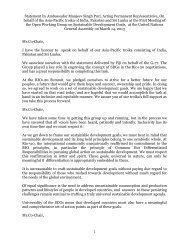statement by ms. sangeeta kumari singh deo, member of parliament ...
statement by ms. sangeeta kumari singh deo, member of parliament ...
statement by ms. sangeeta kumari singh deo, member of parliament ...
Create successful ePaper yourself
Turn your PDF publications into a flip-book with our unique Google optimized e-Paper software.
STATEMENT BY MS. SANGEETA KUMARI SINGH DEO, MEMBER OF PARLIAMENT AND<br />
MEMBER OF THE INDIAN DELEGATION, ON AGENDA ITEM 50: IMPLEMENTATION OF<br />
THE OUTCOME OF THE UNITED NATIONS CONFERENCE ON HUMAN SETTLEMENTS<br />
[HABITAT II] AND STRENGTHENING OF THE UNITED NATIONS HUMAN SETTLEMENTS<br />
PROGRAMME [UN-HABITAT] AT THE SECOND COMMITTEE OF THE 63 RD SESSION OF<br />
THE UNITED NATIONS GENERAL ASSEMBLY ON OCTOBER 28, 2008<br />
Madam Chair,<br />
We thank the Secretariat for the report on the agenda item “Implementation <strong>of</strong><br />
the Outcome <strong>of</strong> the Second United Nations Conference on Human Settlements (Habitat<br />
II) and strengthening <strong>of</strong> the United Nations Human Settlements Programme (UN-<br />
Habitat)”. We associate ourselves with the <strong>statement</strong> made <strong>by</strong> the distinguished<br />
representative <strong>of</strong> Antigua and Barbuda on behalf <strong>of</strong> the Group <strong>of</strong> 77.<br />
Madam Chair,
India is a founding <strong>member</strong> <strong>of</strong> UN-Habitat and has been an active <strong>member</strong> <strong>of</strong> the<br />
organization. We support its Medium-term Strategic and Institutional Plan <strong>of</strong> UN-Habitat<br />
for the period 2008-2013, particularly the focus on strengthening the catalytic and preinvestment<br />
role <strong>of</strong> UN-Habitat. In this context, we welcome the developments towards<br />
the early operationalization <strong>of</strong> the reimbursable seeding operations activities, which will<br />
permit UN-Habitat to assist national housing development programmes. India has been<br />
active, particularly through public housing finance institutions, in promoting institutional<br />
housing finance to the poor and economically weaker sections. We look forward to the<br />
experimental phase <strong>of</strong> reimbursable seeding operations, which will lead to larger followup<br />
investment.<br />
We also support the guidelines on decentralization and strengthening <strong>of</strong> local<br />
authorities, adopted <strong>by</strong> the Governing Council <strong>of</strong> UN-Habitat. We were happy to host a<br />
meeting earlier this year <strong>of</strong> the Advisory Group <strong>of</strong> Experts on Decentralization. India has<br />
always advocated greater involvement <strong>of</strong> local authorities in decision making as well as<br />
in implementation <strong>of</strong> policies. Our efforts have involved greater representation <strong>of</strong> all<br />
sections <strong>of</strong> society in local authorities, expansion <strong>of</strong> their functional domain to focus on<br />
environment, local economic development, planning as well as innovative resource<br />
mobilization.<br />
It is satisfying that the resource mobilization efforts <strong>of</strong> UN-Habitat have borne<br />
fruit. However, it is <strong>of</strong> concern that regular budget, which provides non-earmarked and<br />
predictable funding, remains low. We fully support the demand for enhanced budgetary<br />
resources for UN-Habitat.<br />
Madam Chair,<br />
We agree with the report <strong>of</strong> the Secretary-General that the urban poor are<br />
among the most exposed victi<strong>ms</strong> <strong>of</strong> the current food and energy crises. While it is<br />
perhaps simplistic to blame rapid urbanization for contributing to the rise in food and<br />
energy prices in 2008, as the report appears to do, the need for sustainable<br />
urbanization is inescapable, in both developed and developing countries. We agree with<br />
the report <strong>of</strong> the Secretary-General that rational land-use planning, green building<br />
codes and energy efficient transport options are key to reduce energy consumption and<br />
emissions. In this context, I am happy to highlight that India has been active in taking<br />
such steps, including the adoption <strong>of</strong> an Energy Conservation Act and an Energy<br />
Efficiency Code for new commercial buildings, as well as promoting use <strong>of</strong> compressed<br />
natural gas for public transport.<br />
I would also like to emphasize India’s efforts in promoting an integrated<br />
approach to urban development. A National Urban Housing and Habitat Policy was<br />
launched last year. The policy seeks to realize the goal <strong>of</strong> “Affordable Housing for All”,<br />
through sustainable development <strong>of</strong> habitat, towards ensuring equitable supply <strong>of</strong> land,
shelter and services at affordable prices to all sections <strong>of</strong> society. An important element<br />
<strong>of</strong> this policy is the “Jawaharlal Nehru National Urban Renewal Mission”. This<br />
programme seeks to provide seven basic services to the poor, namely, land tenure,<br />
affordable shelter, water, sanitation, education, health and social security. The<br />
programme is a fast track, demand-driven, community partnering mechanism with<br />
emphasis on public-private-people participation in urban planning and implementation.<br />
This is complemented <strong>by</strong> programmes to promote urban employment generation, with<br />
emphasis on gender equality. In addition, there is enhanced focus on urban safety.<br />
However, India remains a country with a large proportion <strong>of</strong> rural population.<br />
Accordingly, India has also been actively promoting affordable rural housing. These<br />
include programmes like the “Indira Awaas Yojna”, which provides direct support<br />
through grant-in-aid for construction <strong>of</strong> dwelling units and upgradation <strong>of</strong> temporary<br />
houses. Our integrated strategy also covers the issue <strong>of</strong> poverty eradication through<br />
targeted policies and interventions that aim to promote employment and enhance<br />
livelihood opportunities in rural areas, particularly through creation <strong>of</strong> economic<br />
infrastructure, and community and social assets.<br />
Madam Chair,<br />
Enhanced efforts <strong>by</strong> the international community to provide financial and<br />
technical assistance, including transfer <strong>of</strong> technology, in the areas <strong>of</strong> poverty<br />
eradication and infrastructure support, remain crucial if the human settlements related<br />
Millennium Development Goals are to be achieved <strong>by</strong> the developing countries. The<br />
holistic focus should be on generation <strong>of</strong> productive employment, creation <strong>of</strong> durable<br />
economic and physical infrastructure and ensuring food security.<br />
Before concluding, Madam Chair, I would like to highlight that India has been<br />
privileged to share appropriate housing technology, particularly in the field <strong>of</strong> costeffective,<br />
environment friendly and disaster resistant construction, with fellow<br />
developing countries within the framework <strong>of</strong> South-South cooperation. The<br />
international community needs to support such South-South initiatives through<br />
triangular cooperation.<br />
Thank You, Madam Chair.<br />
BACK TO TABLE OF CONTENTS



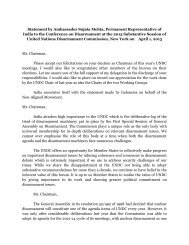
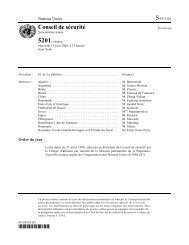
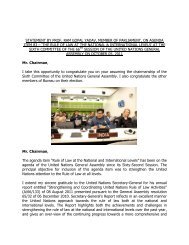
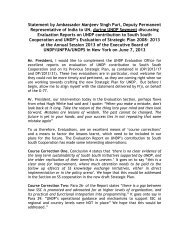
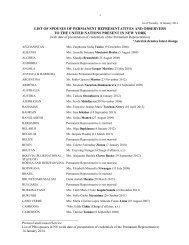
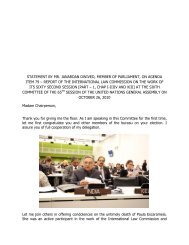
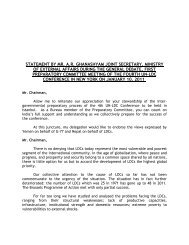
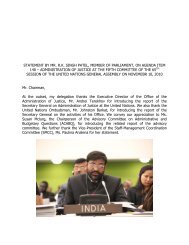
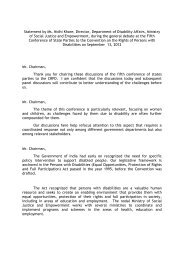
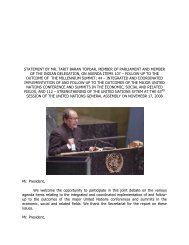
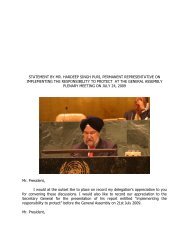
![1 statement by dr.[mrs] kakoli ghosh dastidar - Member States Portal](https://img.yumpu.com/27526598/1/190x245/1-statement-by-drmrs-kakoli-ghosh-dastidar-member-states-portal.jpg?quality=85)
